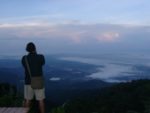Langkawi park risks losing Unesco status
LANGKAWI: An environmentalist warns that the Kilim Geoforest Park, one of the few Unesco-certified sites in Southeast Asia, risks losing its highly coveted status if officials from the body carry out their assessment review during low tide which will reveal the “scars” caused by tourism activities.
Irshad Mobarak, who has dedicated the past 30 years of his life to environmental conservation, said these “scars” were caused by uncontrolled activities such as speeding boats and the feeding of eagles with chicken innards.
In an interview with FMT, the Ecotourism and Conservation Society Malaysia president said during peak periods, the narrow waterways of the geoforest park which is over 300 million years old could be filled with nearly 100 boats. This is despite the waterways spanning 50m to 300m at the most.
He said when the boats sped at over nine nautical knots or 17km per hour, they generated waves which would slowly but surely erode the mudbanks on which the mangroves rest.
At low tide, the damage to these mangroves, which are home to an abundance of wildlife and a natural nursery for fish, prawns and crabs, becomes clear: fallen trees are visible, and the erosion of banks increases the sediment released into rivers which smothers the live corals outside the river mouth.
“This leads directly to a reduction in the number of fish, which depend on the coral reef for survival. This in turn affects the local fishermen’s catch,” Irshad said.
The feeding of Langkawi’s famed Brahminy Kites and the larger White Bellied Sea Eagles was also bad for the wild birds, he said.
“Chicken innards are not the eagles’ natural food. There is a lot of fat and little protein, unlike in sea snakes and fish which they would normally eat.”
Irshad Mobarak
He also warned that chickens were susceptible to diseases, which could prove disastrous if eagles were fed contaminated innards.
He called for a halt to such activities, saying they were anything but ecotourism.
Acknowledging the importance of tourism activities to the local community, he nonetheless advised for these to be carried out in a sustainable manner.
“The locals must not kill the goose that lays the golden eggs. I believe the authorities must take ownership and ensure that this doesn’t happen.”
Irshad said there was no silver bullet to resolve the issue, adding that a multi-pronged approach was needed, starting with the enforcement of speed limits in the geoforest park.
He also proposed a voluntary certification programme for tour and boat operators with three levels of certification.
“This should be issued by the authorities with strict conditions imposed, such as no speeding, no feeding of wildlife and so on.
“The three different levels can offer different services, with operators being allowed to charge certain fees according to their level of certification.”
He said the lowest level of certification should include a guidebook on flora and fauna in the area, while the next level should see that operators have a nature guide on board.
The highest level of certification meanwhile should include having a nature guide on board with a percentage of the fee going towards an eco or social conservation programme for the local community.
“If this becomes a government-endorsed programme, tourists will be more encouraged to choose ethical tour operators. It will also be an incentive for local tour and boat operators to aim for the highest level of certification and earn more.”
He also suggested that brochures in different languages be placed at every entry point to Langkawi to help tourists understand why they should opt for certified operators.
Free Malaysia Today: Langkawi Park Risks Losing Unesco Status
Posted by: Robin Augustin
October 16, 2018
 Previous Post
Previous Post Next Post
Next Post







